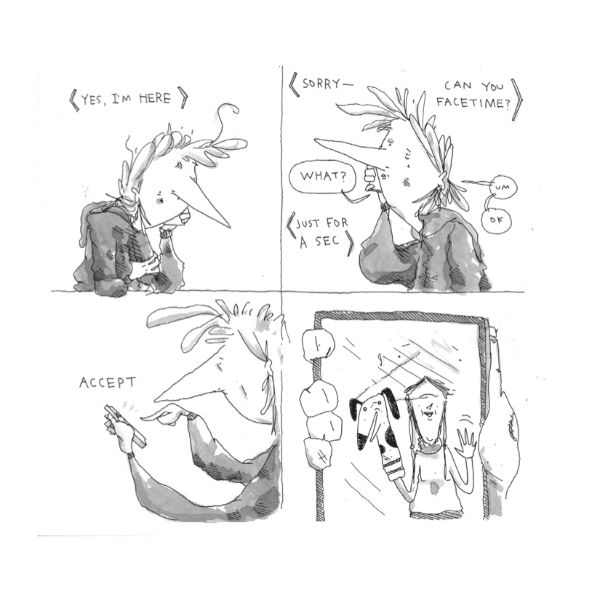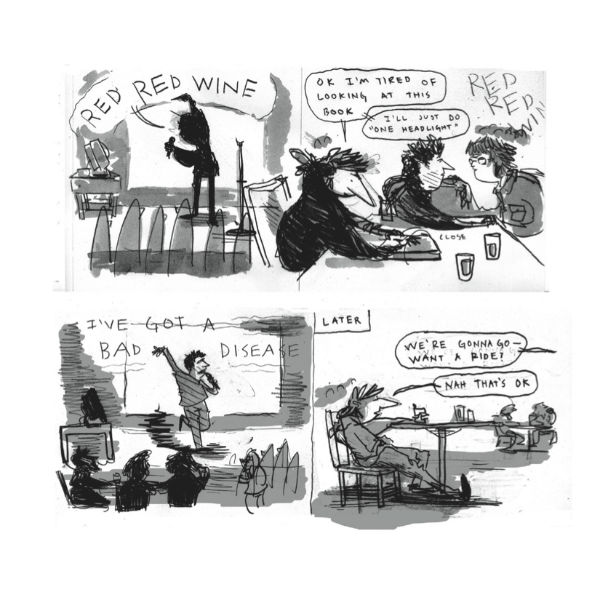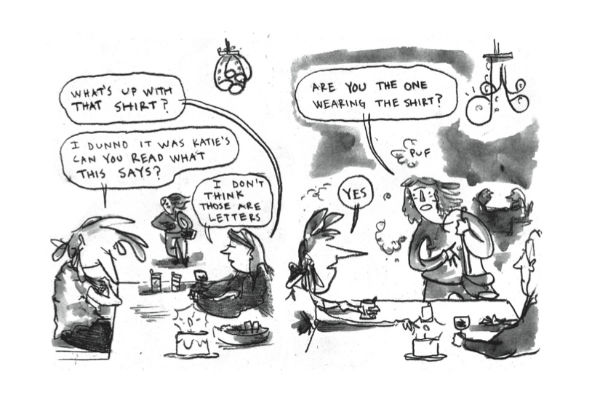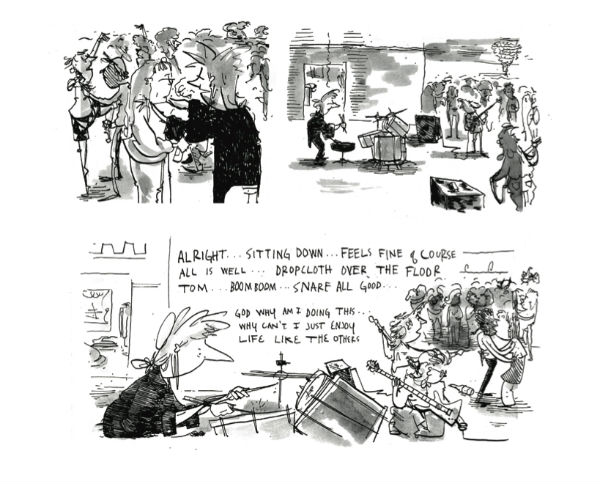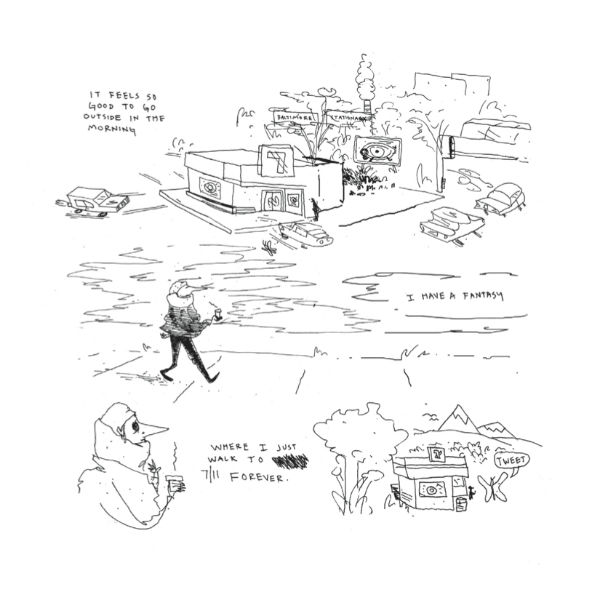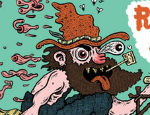 Sara Lautman has firmly secured her place as a cartoonist and illustrator with her professional work for The New Yorker. While Lautman is highly competent at the single panel gag comic, we can gain even deeper insight into both her talents as a cartoonist and her messages as an artist when examining a larger sampling of her work. In the collection Black and White Diary Comics (December – February 2017), from Birdcage Bottom Books, Lautman carefully edits and arranges a handful of moments from her life during those winter months to create a self-portrait of an artist doing their best to make their way in a difficult world. The moments selected are rarely mundane, which gives the collection a feeling more akin to memoir than the standard observational diary comic. While the lack of the introspective narration, so common in autobiographical comics, gives these vignettes a potent immediacy.
Sara Lautman has firmly secured her place as a cartoonist and illustrator with her professional work for The New Yorker. While Lautman is highly competent at the single panel gag comic, we can gain even deeper insight into both her talents as a cartoonist and her messages as an artist when examining a larger sampling of her work. In the collection Black and White Diary Comics (December – February 2017), from Birdcage Bottom Books, Lautman carefully edits and arranges a handful of moments from her life during those winter months to create a self-portrait of an artist doing their best to make their way in a difficult world. The moments selected are rarely mundane, which gives the collection a feeling more akin to memoir than the standard observational diary comic. While the lack of the introspective narration, so common in autobiographical comics, gives these vignettes a potent immediacy.
Lautman wastes no time in getting to the heart of things with the collection’s opening comic Crisis Hotline; a sequence of four-panel medium close-ups recounting her call to a crisis hotline. Her cartooning captures both the compactness of the emotional space she is in and the frantic mental contortions she is going through while making this call. Despite her loosely sketched character rendering, the distress on display is very real. The text of her discussion with the crisis councilor being redacted only further enforces the despair she must have been going through; something so horrible that Lautman is unwilling to share it with the reader.
Our expectations are then completely subverted when the grief counselor appears on the phone with a dog-faced sock puppet over one arm making some of the corniest jokes imaginable. Just as we felt Sara’s pain, now we feel her disbelief at this well meaning but inept counselor. This absurdist moment where the bleak and the saccharine collide is brilliantly tragi-comic and sets the tone for many of the other moments Lautman will dwell on in the rest of the book.
One of the main spaces Sara negotiates is her absurd interactions with the public, particularly in her position as a performer. In multiple instances we will see Sara try to do the right thing in a social setting only to have it backfire and further compound her anxiety. When a man compliments the old rock t-shirt she is wearing, she admits that she is unfamiliar with the band causing him to slink away silently. To complete the tragi-comic moment, a woman then runs up to Sara telling her that complimenting her t-shirt was the first time that the man (her uncle) had spoken in over 30 years.
Equally cringeworthy is when, wrapping a night spent drinking at a karaoke bar, Sara performs The Wallflower’s One Headlight only to discover she forgot how dumb the lyrics are. When a group of cheering bros surrounds the stage, she becomes just a ridiculous as the performers she had comically caricatured in previous panels and flees the scene.
All of this culminates in the centerpiece comic of the collection: A Competent Drummer detailing Sara’s experience of performing with a band for the first time in a few years. All the glamor of being a rock star is quickly washed away as we see Sara admiring the venue while her band mate struggles to load in a heavy drum kit, or when she recognizes a ‘zine she owns that’s being sold at the show dating back to the ’90s. Making small talk with people in the crowd further wears on her and driving her to drink more than the one beer she had allotted herself at the grocery store.
There’s a telling line Sara thinks during the sound check about the familiar feeling of, “genuine confidence canceled out by a pretense of confidence.” In becoming overwhelmed sometimes all you can do is put on a brave face and do your best. Though Sara ponders her own inability to simply enjoy her moment on stage the way she imagines everyone else doing, her responsibilities as a drummer eventually drown out her own thoughts. They return after the set and her despondency sends her fleeing. When she apologizes to her band mates about exaggerating her musical talents they instead compliment her competency. Its not the response she wants, but it’s the response she gets. The scene ends with Sara unable to find solace in either the literal or metaphoric communal dance party everyone else is engaged in.
A few of the comics near the end of this collection, while maintaining Lautman’s sense of humor, do offer Sara the peace she is seeking. A conversation with her roommate about a spoiled family size package of blueberries hints at a difficult family situation, but it is also a relatable domestic moment of talking in the kitchen. The final comic explaining her desire to walk eternally in the crisp morning air with coffee in hand really nails the quiet comforts of the introvert. It’s not the outside world that is overwhelming, its all the people in it.
Lautman’s style is the perfect match for the low-key anxiety of the stories she is telling. Characters are sketchy and scribbly, rarely on model. Yet, they are fervently alive. The karaoke singers strut and fret their moment on stage, the shirt admirer’s niece is frazzled and out of breath, the grief counselor is disheveled and her puppet ragged, yet both are smiling. Just as with Lautman’s depiction of herself, these characters bend and crumple in way that is deeply human.
While her page constructions are simple, the panels are never sparse. Every line is organic and frenetic, the grey shading only loosely beholden to the line work. Whether the line is thick or fine, it is always applied deliberately and with great effect. She captures not just the emotion of the characters, but the emotional spaces they inhabit. That she can recognize these moments of humanity in an overwhelming work and channel some of their energy back to us is a gift.
Sara Lautman (W/A) • Birdcage Bottom Books, $6.00
Available at Birdcage Bottom Books
Review by Robin Enrico





